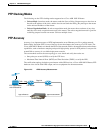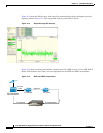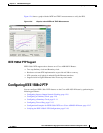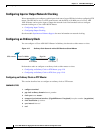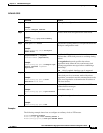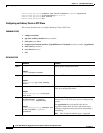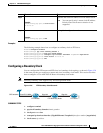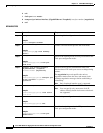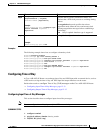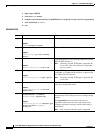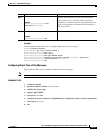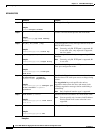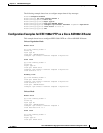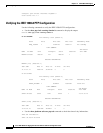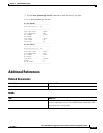
12-13
Cisco ASR 1000 Series Aggregation Services Routers Software Configuration Guide
OL-16506-17
Chapter 12 IEEE 1588v2 PTP Support
Configuring IEEE 1588v2 PTP
Examples
The following example shows how to configure a boundary clock:
Router# configure terminal
Router(config)# ptp clock ordinary domain 0
Router(config-ptp-clk)# clock-port SLAVE slave
Router(config-ptp-port)# transport ipv4 unicast interface Loopback11 negotiation
Router(config-ptp-port)# clock source 10.10.10.10
Router(config-ptp-port)# exit
Router(config-ptp-clk)# clock-port MASTER master
Router(config-ptp-port)# transport ipv4 unicast interface Loopback10 negotiation
Router(config-ptp-port)# end
Configuring Time of Day
A Cisco ASR 1002-X Router can exchange time of day and 1PPS input with an external device, such as
a GPS receiver, using the time of day and 1PPS input and output interfaces on the router.
Perform these tasks to
configure Time of Day (ToD) messages on the Cisco ASR 1002-X Router:
• Configuring Input Time-of-Day Messages, page 12-13
• Configuring Output Time-of-Day Messages, page 12-15
Configuring Input Time-of-Day Messages
This section describes how to configure input time-of-day messages.
Note You can configure time-of-day input only in a PTP master clock port.
SUMMARY STEPS
1. configure terminal
2. ptp clock ordinary domain domain_number
3. tod{R0 | R1} {cisco | ntp}
Step 8
transport ipv4 unicast interface
{GigabitEthernet | Loopback}
interface-number [negotiation]
Example:
Router(config-ptp-port)# transport ipv4
unicast interface Loopback10
negotiation
Specifies the IP version, transmission mode, and
interface that a PTP clock port uses to exchange timing
packets.
The negotiation keyword specifies the unicast
negotiation mode where the slave and master clock
exchange negotiation messages before establishing a
relationship.
Note Only Loopback interface type is supported.
Step 9
end
Example:
Router(config-ptp-port)# end
Exits global configuration mode.
Command Purpose



